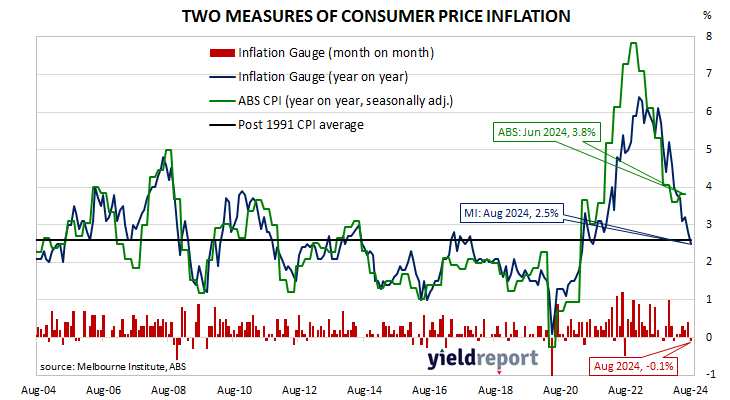Summary: Melbourne Institute Inflation Gauge index down 0.1% in August; up 2.5% on annual basis; Westpac: largely reflects electricity rebates; ACGB yields rise; rate-cut expectations soften, February cut no longer fully priced in.
The Melbourne Institute’s Inflation Gauge is an attempt to replicate the ABS consumer price index (CPI) on a monthly basis. It has turned out to be a reliable leading indicator of the CPI, although there are periods in which the Inflation Gauge and the CPI have diverged for as long as twelve months. On average, the Inflation Gauge’s annual rate tends to overestimate the ABS rate by around 0.1%, or at least until recently.
The Melbourne Institute’s latest reading of its Inflation Gauge index indicates consumer prices decreased by 0.1% in August, in contrast with the increases of 0.4% and 0.2% posted in July and June. Inflation on an annual basis slowed from 2.8% to 2.5%.
“This was the first month decline in almost 6 months, and [it] largely reflects the electricity rebates flowing to households and small businesses,” said Westpac senior economist Pat Bustamante.
Commonwealth Government bond yields rose across the curve on the day, somewhat outpacing the upward movements of US Treasury yields on Friday night. By the close of business, the 3-year ACGB yield had gained 6bps to 3.60%, the 10-year yield had added 4bps to 4.02% while the 20-year yield finished 6bps higher at 4.42%.
Expectations regarding rate cuts in the next twelve months softened, with a February 2025 rate cut now longer fully priced in. Cash futures contracts implied an average of 4.33% in September, 4.32% in October and 4.28% in November. February 2025 contracts implied 4.115% while August 2025 contracts implied 3.55%, 79bps less than the current cash rate
Central bankers desire a certain level of inflation which is “sufficiently low that it does not materially distort economic decisions in the community” but high enough so it does not constrain “a central bank’s ability to combat recessions.”


